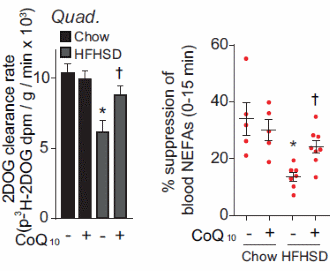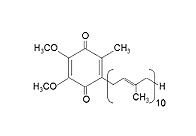|
Definition: "An ergogenic aid is any substance or phenomenon that enhances performance "
|
|
||||||||
15.02.2018 |
|
|
Q10 makes cells more sensitive to insulin
The more sensitive your cells are to insulin, the healthier you are. Just ask diabetics. Or pharmacological bodybuilders who have used so much insulin that their muscles no longer respond to that hormone. Australian molecular scientists have discovered that insulin sensitivity increases as the concentration of Q10 rises in the mitochondria of the cells.
Human study
Of course, the concentration of free fatty acids decreased more in the healthy subjects [bottom left].
The researchers also determined the amount of Q10 in the mitochondria of the subjects. And in both healthy and insulin-resistant subjects, the concentration of free fatty acids plummeted more as their mitochondria contained more Q10 [top right].
Animal study
The researchers then gave half of both groups a dose of Q10 every other day for two weeks. The researchers used Q10 in the form of LiQsorb, a product from the Tishcon Corporation. [tishcon.com] Every two days the researcher injected the Q10 directly into the small intestine of the test animals.
This mode of administration is roughly twice as effective as oral administration. If the mice had been human, they would have taken about 160 milligrams of Q10/LiQsorb daily.
After the supplementation period the mice were given a form of glucose [2DOG]. In the fattened-slash-diabetic mice the supplementation with Q10 made the glucose analogue disappear faster from the blood [bottom left]. The supplementation also caused the concentration of free fatty acids to decrease more after the administration of the glucose variant [bottom right]. Ergo: Q10 partially raised insulin resistance.
Conclusion
"Energy production can also generate reactive chemical species - often referred to as 'reactive oxygen species' or 'oxidants' - as by-products, which can be damaging to cells. Previous studies have shown that these oxidants can cause insulin resistance. Our study has found that lower mitochondrial CoQ enhanced oxidant formation by mitochondria."
"Importantly, by replenishing CoQ in mitochondria, either in cells or in animals, we were able to restore 'normal' mitochondrial oxidants and reverse insulin resistance."
"Replenishing CoQ could prove an invaluable preventive measure for insulin resistance- or pre-diabetes-linked diseases such as type 2 diabetes, cardiovascular disease, cancers and dementia", says research leader David James, also affiliated with the University of Sydney.
Source: More: Archives:
|
|
|||||||||||||||






